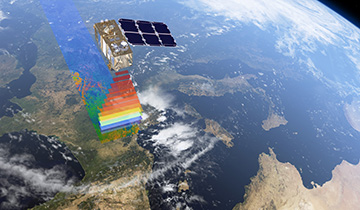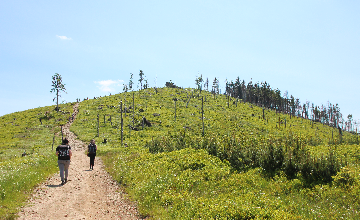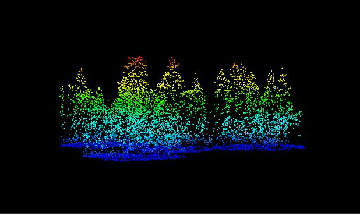Bachelor of Science (B.Sc.) and Bachelor of Arts (B.A.)
Scene: Berlin, Sentinel-2 satellite image, 2015. Source: Copernicus Open Access Hub
Modules offered by the Earth Observation Lab are open to students from all study programs in the Geography Department. Topics cover a wide range of geographic research questions. These are mainly related to physical geography and land system science, and yet are often relevant for economic geography or urban and rural planning. Depending on the regulations of the study program, students are offered different combinations of mandatory and optional courses.
In case you wish to specialize in remote sensing during bachelor studies you may take a look at the recommended B.Sc. schedule below and consult our staff for developing your individual study plan. If you are interested in writing your thesis in the field of remote sensing you can take a look at the list of best practices and take these as an inspiration for your own topic.
Our modules
German: Einführung in die Geofernerkundung
This module introduces students to basic concepts of remote sensing and its application in various fields of geography. Students learn how to design a remote sensing study for a geographic research question, how to acquire and analyse the image data, and how to interpret the results. The integration of additional geodata sources and the use of remote sensing products in GIS projects are exemplified.
Colour Vision for Copernicus. Photo: ESA/ATG medialab
- Prerequisites: Statistics, Introduction to GI
- B.Sc. (2018): mandatory
- B.Sc./B.A. (2014): optional (highly recommended for those advancing to M.Sc. Global Change Geography)
German: Studienprojekt-Felderhebungen und Fernerkundung
Here, students learn how to set up their own research project, apply methods to assess land cover and land use changes from various remote sensing data sets and get detailed insights into planning and conducting practical field work. The study project is based on a well defined research question, carefully determined through the students' literature reviews. Photo: Kira Pfoch
Study project 2018, Polish Carpathians
- Prerequisites: Introduction to Remote Sensing
- B.Sc.: optional (recommended for students with interest in bachelor thesis in applied remote sensing)
- B.A.: optional
German: Vertiefungsmodul Vegetationsfernerkundung
The monitoring and mapping of vegetation and land cover is one of the key activities in Earth observation (EO). Advanced EO products are pivotal for many geographic and environmental studies. In this module students learn concepts and techniques for analyzing and mapping land cover and its characteristics at various spatial scales and with different sensor systems. Data analysis is done fully in R, and students learn to create customized R-scripts along a series of processing tasks throughout the semester.
Canopy Height model, Camp Creek, West Virginia, USA, D. Pflugmacher
- Prerequisites: Introduction to Remote Sensing
- B.Sc.: optional (recommended especially for students with interest applied programming and bachelor thesis in methods of remote sensing)
- B.A.: optional



